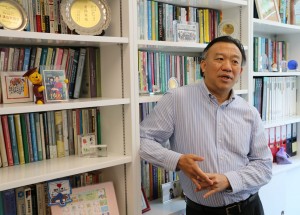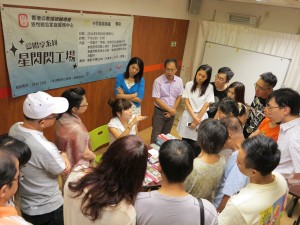Marriage counsellers help couples to bury the hatchet and reconcile or part amicably
By Tracy Cheung & Benny Kung
Charles, now a 21-year-old undergraduate, can never forget the moment he called the police to stop his parents from fighting with each other. As an eight-year-old, he was terrified by an incident in which a chair was shattered into pieces and his parents had blood on their faces. Parents quarrelling over money and daily matters was a constant in his childhood.
Divorce was a topic repeatedly mentioned, but never realised. “I have always said if you want to divorce, go for it. As a child, I really understood this,” he says, adding that maintaining marital relations without addressing the problems is harmful to both parties and to any children of a marriage.
Charles (who does not want to disclose his full name) believes if his parents had sought help from marriage counselling, there may have been a remedy or at least some respite from their unhappy union. “Either they divorce or separate, or share the assets; everything will be much smoother with a middle-man. They do not have to torture each other for so long,” he sighed.
“My parents have lots of misunderstandings which are very complicated … if there had been a marriage counsellor, my father could have learnt how to deal with my mum’s emotions,” he says. A social worker from the Social Welfare Department did step in after the first incidence of domestic violence, but Charles believes they could not compare to a professional marriage counsellor. “Social workers may not know how to solve conflicts. Their only resort seems to be divorce or calling the police. But [a marriage counsellor] as a middle-man should be able to mediate the tension like lubricant,” he says.
Without support from any counselling or mediation services, Charles tried to solve the family problem by himself, but to no avail. “One of my relatives said if I studied hard I could make them happy and bring them together again,” he recalls. Nothing worked – the bickering and strained relations lasted until Charles’ dad passed away in June.
Unfortunately, Charles’s experience is not rare or unusual. According to the latest figures from the Statistics Department, the divorce rate has gone up from just under 1.6 per cent in 1993 to just under 3.5 per cent in 2013.
Dr Yeung Ka-ching, principal lecturer in the Department of Social Work and Social Administration at the University of Hong Kong, says both social and economic factors contribute to a growth in the number of divorces – such as women having higher financial autonomy, lower institutional barriers for divorce and the social acceptance of remarriage. But Yeung thinks there is something else. He is concerned the attitude towards marriage of the new generation has changed – from being a lifelong promise to an “easy come, easy go” decision. “In general, getting a divorce is easier and the cost is lower. Even if you remarry after divorce, society is more accepting,” Yeung says.

Marriage counselling in Hong Kong is provided by Integrated Family Service Centres under the Social Welfare Department, NGOs, churches and independent practitioners like psychologists and counsellors. Counselling services provided by independent practitioners generally cost around HK$1,000 for a one-hour session.
Yeung explains that marriage counselling provides a platform for couples to solve their most urgent concerns, then remedy their relationship, rather than to save a marriage at all costs. “Even if the couple realise they should get divorced in the end, it can be good [to get] counselling as they can have a happier life afterwards,” he says.
Yeung believes that although marriage counselling has become better accepted in recent years, Hong Kong society is not open-minded enough to make it a mainstay. “In the US, people just frankly share the names of their counsellors. In Hong Kong, people cannot fully accept it,” he says. Many still see marriage as a private matter and are ashamed to share problems with outsiders. Some even worry seeking marriage counselling will harm the family’s reputation. These views deter couples from seeking help at an early stage.
Rose (who does not want to disclose her full name), 45, broke up with her husband and ended their seven-year marriage after discovering he had been unfaithful. Yet their relationship began to deteriorate as early as their honeymoon in the US, when Rose had serious conflicts with her husband due to their different personalities and habits. In the second or third year of marriage, Rose began to bring up divorce during quarrels. “Every time I returned home after work, I had to take a deep breath before going in. That home was not a place where I could comfortably rest,” she says.
“If both of us had joined marriage counselling in the early years, we may have had the opportunity to compromise, instead of pushing the other half to fit your style,” says Rose. She did try to seek help from marriage counselling services through the church, but her husband gave her the cold shoulder, refusing to acknowledge the problem and the need for a remedy. Rose gave up her hope for marriage counselling.
Five years later, when she finally filed for a divorce, the court suggested she attend a counselling session with a mediator before processing her application. “At that time I turned a deaf ear to everything the counsellor said. I was already determined to file the document for divorce, nothing could change me,” she says.

After the heady, blissful days of dating, weddings and honeymoons, some people may find their partners hard to tolerate as tension builds up in intimate daily interactions. Sam (who does not wish to disclose his full name), aged 36, started quarrelling with his wife over differences in personal habits shortly after they got married three years ago. Sam hates what he sees as his wife’s untidiness. “My wife will put her pyjamas aside without tidying it up or taking it to the laundry. I will scold her; why she can’t do the simple thing right?” he says, while his wife complains that she had little private space living with Sam’s parents in a small apartment.
During the unhappy days when the marriage troubled him a lot, Sam considered divorce an easy way out. However, hi
s love for his wife motivated him to look for solutions to save their marriage. In the Grace and Joy Integrated Family Service Centre, a non-governmental organisation (NGO) that offers marriage counselling and workshops, Sam learnt to control his manner of expression and tone when talking to his wife. Later, he invited her to join marriage counselling sessions.
“We should positively handle the small conflicts before things get worse. Otherwise, it will be harder to tackle,” Sam says. The couple enhanced their mutual understanding and learnt to recognise their differences in the programme. After moving to a new home close to Sam’s parents, their relationship has improved gradually and they have continued to attend regular marriage counselling sessions.
Despite the importance of marriage counselling, Angela Chui Yuen-fun, the executive director of the Hong Kong Catholic Marriage Advisory Council (CMAC), thinks the development of marital counselling in Hong Kong still leaves a lot to be desired.
In 2004, the Social Welfare Department restructured the family service system by putting NGOs operating under the system into the government-run Integrated Family Service Centre – CMAC is one of its cooperating branches. Before the restructuring, CMAC put most of its resources into marriage education and dealing with distressed couples. But now the organisation is responsible for the general counselling service of a district, instead of its area of specialisation.
“The government thinks an Integrated Family Service Centre can deal with all social problems … The impact on us is we need to put aside our specialty. We feel the approach is not very right, instead we should have a marriage counselling centre for the whole city,” she says.
“I have been working in this field [marriage counselling] for a long time. I know the service must be provided by well-trained counsellors as we understand what these divorced couples have gone through,” Chiu says.
Chiu points out that many unresolved marital problems will recur even if a couple divorces and one or both former partners marry again. “It’s human nature to think they have done nothing wrong and the blame should be on their other half. When it comes to the second marriage, problems can resurface,” she says.
Based on this understanding, CMAC relaunched a self-financed marital counselling service branch in 2006 and stepped up efforts to promote family life education in schools.
Celebrating their 28th anniversary of marriage this year, Mr and Mrs Ho believe it is easier said than done to maintain a harmonious and stable relationship. Though the Ho’s have not encountered any major crisis in their marriage, they have been taking part in relationship maintenance courses for a decade. “When I suggested taking a marriage course, I did not intend to solve conflicts. I just want to create topics between us,” Mrs Ho says.

The first marriage course they enrolled in was Hong Kong Marriage Encounter in 2004, a camp for couples to open up to each other and share their feelings frankly. “These courses make me more empathetic. When I care for my wife, I put myself into her shoes,” Mr Ho says, smiling. He adds the most amazing moment was when they renewed their wedding vows in one of the training sessions.
While most couples believe only that marriage counselling is for managing crises and conflicts, Mr and Mrs Ho believe constant effort must be put into maintaining the relationship, not just the marital status. “Once you get married with her, it is a lifetime promise,” Mr Ho says, as Mrs Ho nods and smiles.
Edited by Cindy Ng










































